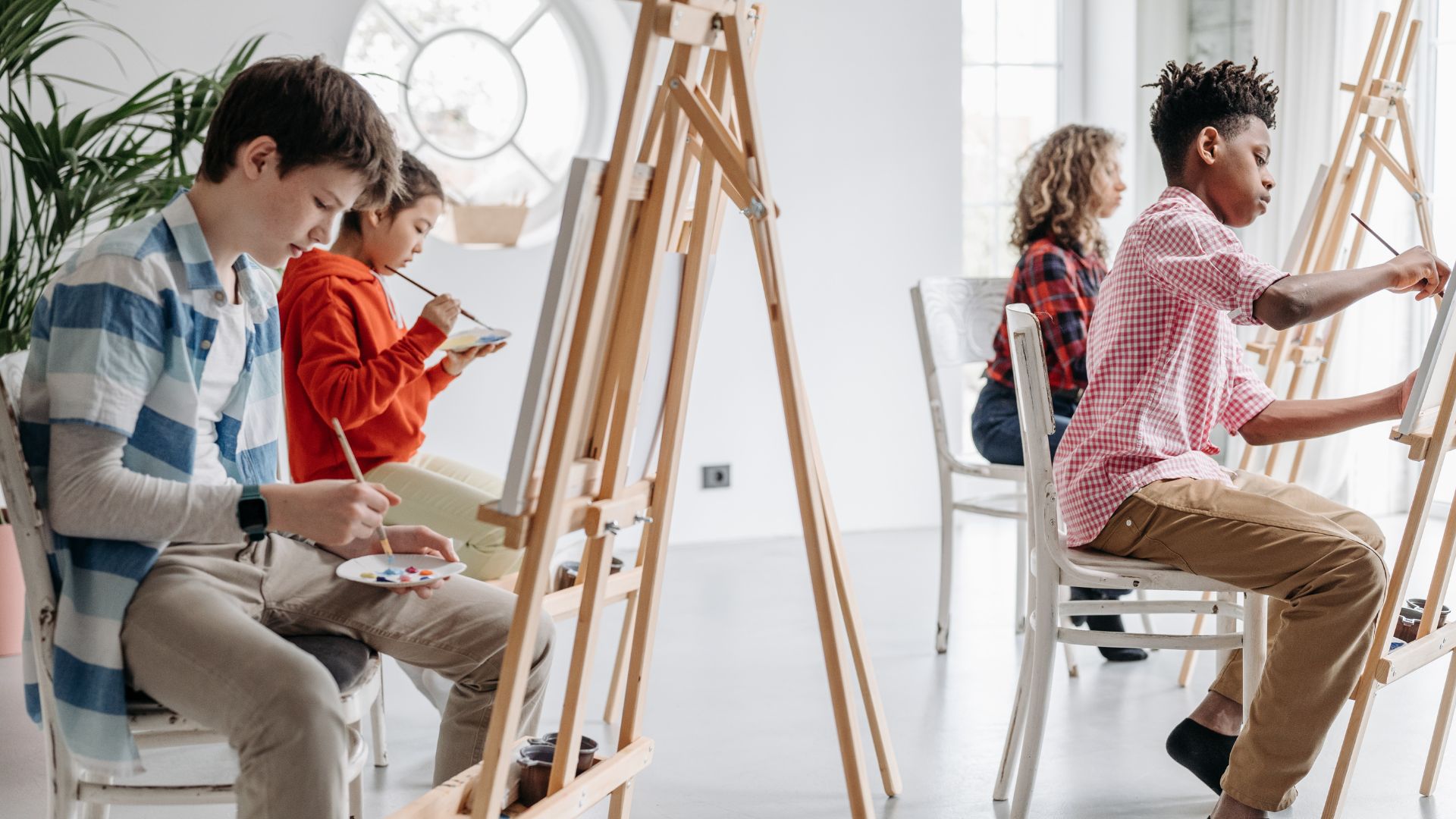When it comes to fostering creativity in kids, art projects are an incredible way to spark imagination and self-expression. But what about using wall paint on canvas for these projects? Let’s dive into the world of children’s art and explore whether wall paint can be a vibrant medium for their artistic endeavors.
Understanding Wall Paint and Canvas
Wall paint, typically used to adorn our living spaces, comes in a variety of formulations—latex, acrylic, or oil-based. On the other hand, canvas, a sturdy fabric, is the quintessential material for paintings due to its texture and durability.
Can You Use Wall Paint on Canvas for Children’s Art Projects?
Absolutely! Wall paint can be an excellent choice for children’s art on canvas. It’s safe, washable, and comes in a wide array of colors that can ignite a child’s imagination.
Advantages of Using Wall Paint for Kids’ Canvas Art
1. Color Palette Diversity
Wall paints offer an extensive range of colors, allowing kids to create vibrant, eye-catching masterpieces.
2. Washable and Safe
Most wall paints designed for interior use are water-based and non-toxic, making them safe for children to handle. Plus, they are easily washable, saving you from worries about stains.
3. Cost-Effective
Utilizing leftover wall paint can be a cost-effective solution for art projects, sparing additional expenses on specialized art supplies.

Tips for Using Wall Paint on Canvas with Kids
1. Protect Your Workspace
Cover the working area with old newspapers or a plastic sheet to prevent spills and splatters.
2. Use Brushes Appropriately
Ensure you have suitable brushes for the different textures of canvas. Experiment with different brush sizes and shapes for varied effects.
3. Encourage Creativity
Let your child’s imagination flow freely. Offer guidance but encourage them to explore and experiment with colors and techniques.
So,…Unleash Your Child’s Creativity with Wall Paint on Canvas
Using wall paint on canvas for children’s art projects is not only permissible but also an exciting and budget-friendly way to nurture your child’s artistic flair. It encourages creativity, offers a spectrum of colors, and allows for a mess-free, washable experience.
Exploring Techniques with Wall Paint on Canvas
1. Blending Colors
Teach your child how to blend colors on canvas using wall paint. This technique allows them to create gradients and new hues by mixing different shades.
2. Experiment with Textures
Encourage exploration by using various tools like sponges, cotton swabs, or even fingers to create textured effects on the canvas. This adds depth and dimension to their artwork.
3. Masking and Stenciling
Introduce masking tape or stencils to create clean, defined lines or shapes. This technique helps kids achieve precise designs while having fun with patterns and shapes.
Addressing Common Concerns
1. Longevity of Artwork
While wall paint can be durable, consider sealing the finished artwork with a clear acrylic sealer or varnish to protect it from fading or damage.
2. Stain Removal
In case of accidental spills or stains on clothes, swiftly wash the affected area with water and mild soap. For stubborn stains, seek professional advice or use stain removers suitable for fabric.
Embracing Creativity Beyond Canvas
Encourage your child to explore other surfaces for painting with wall paint, such as cardboard, paper, or even rocks. This opens up a world of possibilities and keeps their creativity flowing.
External Resources for Deeper Insights
To delve further into techniques and tips for painting with kids, these resources provide valuable information:
- Creative Kids’ Art Techniques: A Guide for Parents
- Exploring Painting Techniques for Children
- Art Education for Kids: Inspiring Creativity
Conclusion: Unleashing Boundless Creativity
With wall paint on canvas, children can unlock a world of creativity. Beyond the mere act of painting, this activity nurtures problem-solving skills, enhances motor skills, and boosts confidence through artistic self-expression.
So, let the vivid colors of wall paint be the gateway to a magical world of art for your child. Embrace the mess, celebrate the process, and cherish the masterpieces they create. Encourage, guide, and most importantly, cherish these artistic moments that shape beautiful memories.
Comparison tabular
Here’s a tabular comparison between using wall paint and traditional acrylic paint on canvas for children’s art projects:
| Aspect | Wall Paint on Canvas | Acrylic Paint on Canvas |
|---|---|---|
| Color Range | Wide range of colors available | Extensive color options, including specialty shades |
| Cost | Cost-effective, often using leftover paint | Specifically purchased; can be more expensive |
| Safety | Water-based, non-toxic, safe for kids | Generally non-toxic, but check labels |
| Washability | Easily washable from most surfaces | Permanent once dried, needs solvents for removal |
| Texture and Finish | Matte or glossy finishes available | Dries to a permanent finish |
| Blendability | Good blendability for creating gradients | Can be blended, but requires skill |
| Longevity | May need sealing for long-term protection | Permanent when dried, less prone to fading |
| Ease of Use | Beginner-friendly, forgiving for mistakes | Requires more skill, less forgiving |
| Additional Supplies Needed | Limited; basic brushes may suffice | Various brushes, mediums, and additives may be required |
This comparison highlights the key differences between using wall paint and traditional acrylic paint on canvas for children’s art projects. Each option has its advantages and considerations, catering to different preferences and needs.
Wrapping up
As you navigate the colorful world of children’s art projects, remember that the choice between wall paint and traditional acrylics on canvas is about more than just paint—it’s about fostering creativity, embracing exploration, and cherishing the artistic journey with your little ones.
Whether you opt for the vibrant versatility of wall paint or the classic appeal of acrylics, what truly matters is the joy of creation, the laughter shared, and the memories made while painting together. Encourage their imagination, celebrate their uniqueness, and revel in the beauty of their artistic expressions.
So, pick up those paintbrushes, lay out the canvases, and embark on an artistic adventure with your children. Embrace the mess, delight in the discoveries, and cherish every stroke of color—they’re not just creating art; they’re creating lasting memories with you.
Above all, let the canvas be a canvas for more than just paint; let it be a canvas for boundless imagination, endless possibilities, and the beautiful moments that paint the canvas of your shared experiences.
Happy painting and creating! 🎨✨
External Resources for Further Exploration
To delve deeper into children’s art projects and explore more creative possibilities, here are three fantastic resources:

For over a decade, I’ve been Mike, an artist, crafter, and designer deeply immersed in the Croc world. I thrive on crafting unique, size-inclusive patterns, fostering creativity, and sharing them on ktforum.com. My designs aim to ignite your creative spark and delight you, ensuring clarity and ease of use through rigorous testing. Join me in expressing your creative flair and showcasing your craft with joy.
Related Posts
- Exploring Alternatives to Wall Paint for Canvas Art
When it comes to creating stunning canvas art, wall paint isn't the only option in…
- Exploring the Cost of Wall Paint for Canvas Art: A Comparative Analysis
When diving into the world of painting, choosing the right type of paint can significantly…
- Exploring Temporary Art with Wall Paint on Canvas
When it comes to art, experimentation knows no bounds. Have you ever considered using wall…
- Preserving Your Canvas Art: Understanding Wall Paint and Fading
Painting on canvas offers a beautiful, expressive way to create art. But when it comes…

